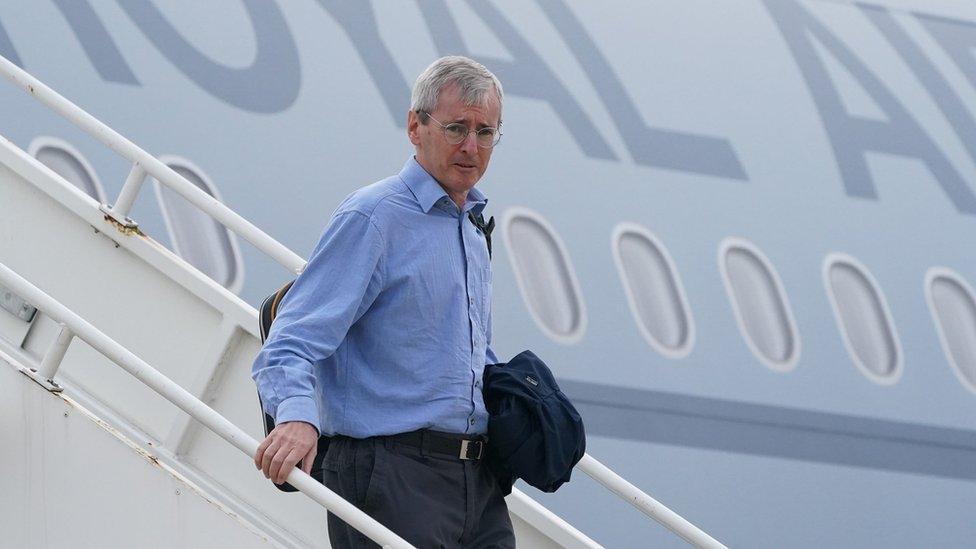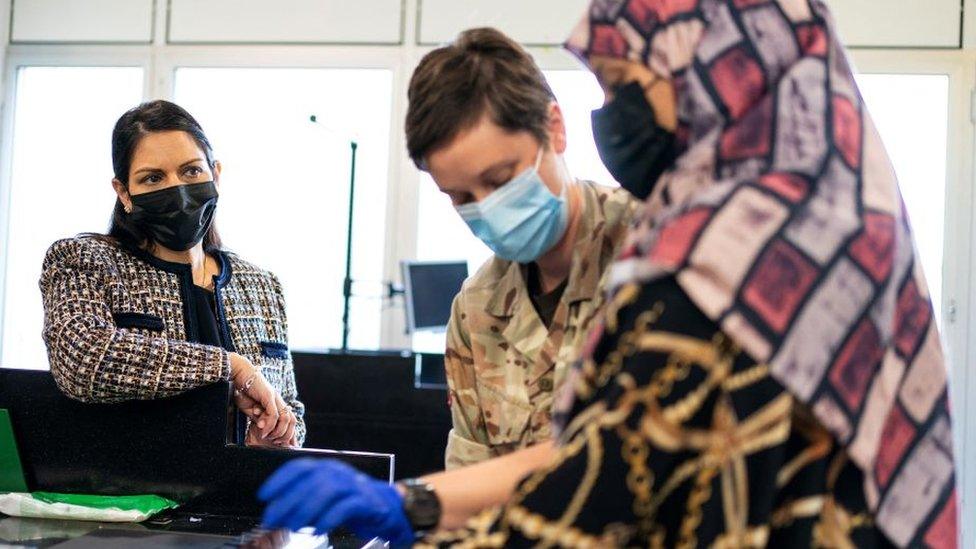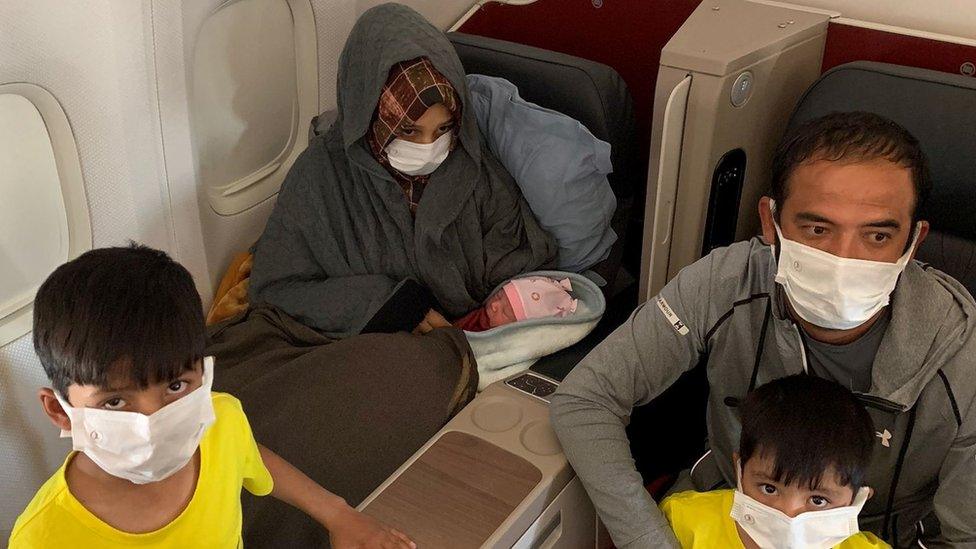Afghanistan: British ambassador home as last UK troops leave
- Published

The British ambassador, Sir Laurie Bristow, has been helping the evacuation effort
The British ambassador to Afghanistan has arrived in the UK, with the last British soldiers to leave Kabul expected to touch down within hours.
The final flight left on Saturday, bringing to an end the UK's 20-year military involvement in Afghanistan.
More than 15,000 people have been evacuated by the UK since 14 August.
Vice Adm Sir Ben Key, who ran the UK's evacuation, said he would be "very nervous" in saying the withdrawal was a success until all the allies had left.
He said it had been a "tremendous international effort" but it wasn't "a moment of celebration for us at all", adding that there was a "sense of sadness" at those left behind.
Prime Minister Boris Johnson said the UK's departure was "the culmination of a mission unlike anything we've seen in our lifetimes".
Ambassador Sir Laurie Bristow, who had been processing those fleeing the country at the airport, was among those who landed at RAF Brize Norton base in Oxfordshire on Sunday morning.
The flight came via the United Arab Emirates and further flights carrying military and civilian personnel are expected later.
Vice Adm Key, chief of joint operations, said that while he "pays testament" to everything achieved by British forces over the last two weeks, "we know that there are some really sad stories of people who have desperately tried to leave that - no matter how hard our efforts - we have been unsuccessful in evacuating".
Speaking at RAF Brize Norton, he said the 31 August deadline imposed by the Taliban prevented them evacuating more people "who had helped us so wonderfully and courageously over the last 20 years".
Photos of exhausted UK service personnel in aircraft coming back from Kabul showed how "deeply tired" they were having "given their all over the last two weeks", he said.
"Some of the pictures that have come back in the last few days have painted a really good impression of just how desperate and difficult those conditions have been in the last few weeks.
"They have been sleeping in rough conditions, eating off ration packs and their sole motivation has been to help as many of the Afghans and British entitled personnel as they possibly could."
He had the most "enormous admiration" for what British troops had done, he added.

At the scene
By James Reynolds, BBC News

The stark image of Britain's ambassador to Afghanistan walking down the steps onto the tarmac at Brize Norton was clear confirmation that Britain's mission in Kabul is now over.
At the bottom of the steps, Sir Laurie Bristow was greeted by a single Foreign Office colleague - the permanent under secretary Sir Philip Barton.
There was no ceremony, no speeches. The diplomats and their colleagues walked off into the terminal building.
A few minutes later members of the 16 Air Assault Brigade - who had been at Kabul airport - walked quietly off the same plane.
The mission may be over - but it's not complete.
A senior naval officer told me of his great sadness that local Afghan allies have been left behind. Their safety is now in the hands of the Taliban.

No 10 said the number of people evacuated included about 2,200 children, with the youngest just one day old.
About 5,000 British nationals and their families were airlifted, alongside more than 8,000 Afghan former UK staff and their families and those considered at risk from the Taliban.
In a video posted on Twitter on Sunday, Mr Johnson praised the "colossal exertions" of those involved in the evacuation operation who worked "to a remorseless deadline, in harrowing conditions".
He said that although the UK "would not have wished to leave in this way", the suffering and hardship of all the troops involved over 20 years was "not in vain".
Boris Johnson: "It's the culmination of a mission unlike anything we've seen in our lifetimes"
Sir Laurie said "for the time being" the UK embassy to Afghanistan would operate from Qatar but it would reopen as soon as possible and "we will continue to stand by the people of Afghanistan".
In a video posted on Twitter,, external the ambassador said the UK government would continue putting pressure on the Taliban "to allow safe passage" to the UK for those Afghans and British nationals "who still need our support".
Lord Dannatt, who was head of armed forces between 2006 and 2009, told BBC Breakfast: "It's a big moment because it's the end of a military chapter - a chapter that's ended not in the way we would have wished."
He said the soldiers involved in the evacuation process at Kabul airport had done "a fantastic job in very difficult circumstances" but he said it was a "tragedy" that some people eligible to come to the UK had been left behind.
He said there should be an inquiry into the UK's 20-year engagement in Afghanistan to look at the "string of strategic errors", including the manner of the evacuation, which he said could have started several months ago and been done "in a more calm and considered way".
Getting the plane out of Afghanistan was "happiest moment of my life"
The US is continuing evacuations ahead of the 31 August deadline for foreign troops to leave the country.
A suicide bombing near the airport on Thursday resulted in some 170 deaths, including two UK citizens and the child of a British national. US President Joe Biden has warned another attack is highly likely.

What happens to Afghan refugees coming to the UK?
Arrivals on official flights enter a 10-day Covid quarantine in a hotel
Government officials and local authorities are trying to find them permanent homes
A shortage of suitable accommodation means many will be placed in hotels
Some will get refugee status and can live in the UK permanently
Others will get a five-year visa to live and work in the UK - and can then apply for permanent residence
Afghans arriving independently will enter the normal system for asylum claims - which has a backlog of 70,000 people
These people cannot settle, or work, while their claims are considered

A new plan to resettle people fleeing Afghanistan, called Operation Warm Welcome, has been announced by the government.
It will be modelled on a similar scheme put in place for Syrian refugees - 20,000 of which came to the UK between 2014 and 2020.
Support will include help with integration and dealing with trauma, free English language courses, and assistance with health, education, accommodation and employment.
The UK government has two schemes to resettle Afghans - the Afghan Relocations and Assistance Policy (ARAP), external for those who worked for the UK government; and the Afghan Citizens' Resettlement Scheme,, external which focuses on women and children, as well as religious and other minorities.

WHAT ARE THE PARALYMPICS?: Everything you need to know about the Paralympic Games
AN INTERVIEW WITH RYAN REYNOLDS: Kermode and Mayo speak to the star about his new film 'Free Guy'

- Published28 August 2021

- Published28 August 2021
